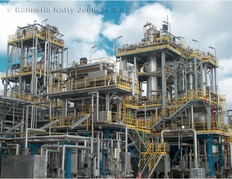- The unit will produce 25,000 tonnes of bioethanol annually.
- Bioethanol will be made from non-food agricultural feedstocks like cereal straw.
- The project aligns with ORLEN's goal of carbon neutrality by 2050.
- The plant will create about 50 new jobs.

Project Overview
PKN ORLEN and ORLEN Południe have signed an agreement to construct an advanced industrial unit at the Jedlicze refinery in Poland. This unit will produce second-generation bioethanol, marking the first such project in Poland and the second in Europe. The facility will have an annual production capacity of 25,000 tonnes of bioethanol.
Feedstock and Production
Bioethanol at the Jedlicze refinery will be produced from non-food agricultural feedstocks, primarily cereal straw sourced from Polish farmers. The bioethanol complex will include a main production unit and an advanced combined heat and power (CHP) plant, which will use a lignin-fired biomass boiler. The lignin, a waste product from the bioethanol production, will be burned in a 48 MW fluidised bed boiler to generate heat for the complex.
Economic and Environmental Impact
The project supports ORLEN Group’s strategic objective of achieving carbon neutrality by 2050 and will strengthen Poland’s position in the European biofuels market. It will also create approximately 50 new jobs, particularly for specialists in advanced biotechnologies, and enhance the utilization of local agricultural potential.
Future Developments
ORLEN Południe plans to undertake further research and development based on this project, focusing on the biological processing of co-products like lignin and dried distillers grains with solubles. The company also aims to expand its feedstock base by incorporating waste products and energy crops such as Miscanthus. This initiative is part of a broader transformation of ORLEN Południe plants into advanced biorefineries using renewable feedstocks.

